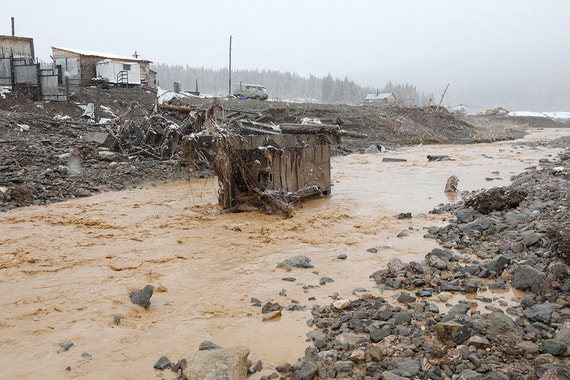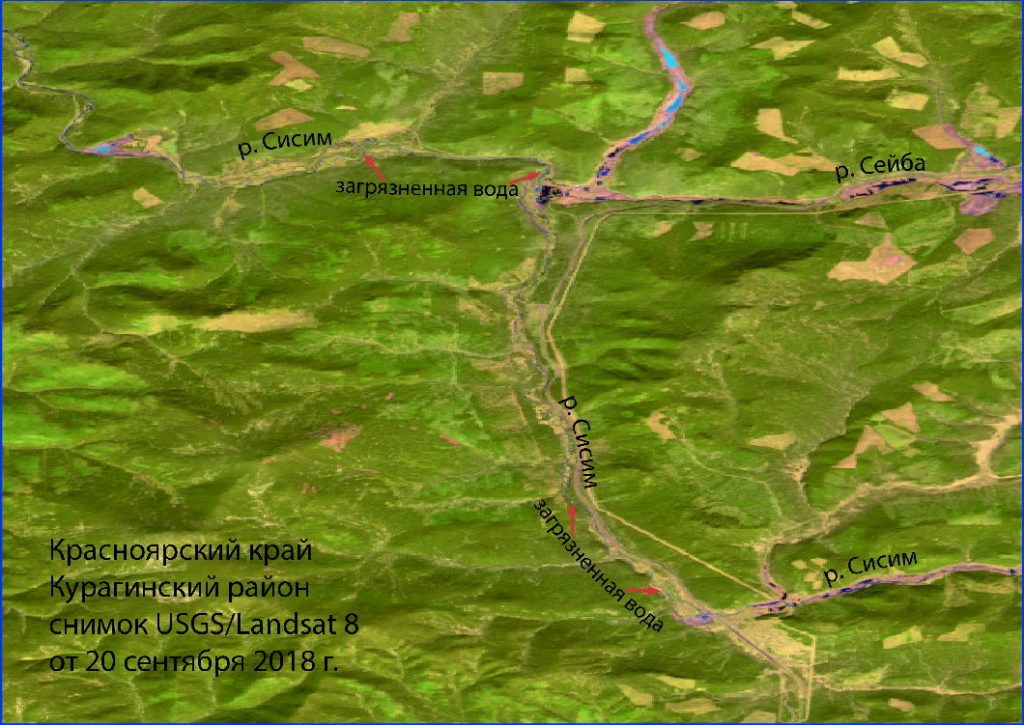Fifteen people were killed and another six missing after a dam collapsed at an artisanal gold mine in a remote Siberian settlement of Shchetinkino at dawn on October 19 in the latest deadly accident to hit Russia.

The Rivers without Boundaries International Coalition since 2008 has been calling on authorities of Russia and Mongolia to follow example of adjacent provinces of Northeast China and phase out placer gold mining in rivers as dangerous, outdated and environmentally damaging type of industry. Unfortunately authorities of two countries have not listened to our arguments and allowed this industry to grow destroying dozens of new rivers. This latest accident happened at gold mining site for which our monitoring by remote sensing has already registered 4 major river pollution incidents, likely resulting from bursting of retention pond dams, in last 3 years. All incidents have been reported to Krasnoyarsk branch of Rosprirodnadzor (Russian National Environmental Enforcement Agency), which turned blind eye on obvious violations of technological discipline and environmental protection regulations. Now authorities claim they were not aware of such violations, but at least 15 people paid with their lives for this careless behavior…. Below reporting by the AFP.

The dam on the Seiba River in the Siberian region of Krasnoyarsk burst and flooded several cabins where workers lived, authorities said.
Icy and muddy floodwaters hit the cabins in a mining camp located near the village of Shchetinkino early Saturday morning as the workers were resting.
A rescue-and-search mission will last through the night, said Alyona Aleksishina, spokeswoman for the regional branch of the emergencies ministry.
“It will continue despite everything,” she told AFP.
Six people were still missing, she said.
Officials said the dam had been built in breach of safety rules and claimed that the authorities were not aware of its existence.
President Vladimir Putin ordered officials to provide assistance to the victims and identify the reasons for the accident, his spokesman Dmitry Peskov told reporters.
Investigators said they have opened a criminal probe into a breach of safety rules.
Sixteen victims received medical aid, and four of them were airlifted to a regional hospital.
A team of doctors including a neurosurgeon were dispatched to the scene from the city of Krasnoyarsk, which is located some 4,000 kilometers (2,500 miles) east of Moscow.
Footage broadcast on national television showed the remote settlement surrounded by the woods and mountains, the ground covered in light snow.
Overall, about 180 workers were thought to be living at the remote mining site.
– Violation of ‘every single norm’ –
An unidentified worker from the mine told Govorit Moskva, a Moscow-based radio station, that people had been caught by surprise.
“People were sleeping, apparently they did not even understand anything,” he said.
He described the accommodation as hastily built cabins.
“That says it all,” he said.
The worker said there were four such dams in the area that had been built more than three years ago, adding that smaller breaches had happened in the past.
The dam was built in violation of “every single norm,” said the head of the local government, Yury Lapshin.
Rains could have eroded the dam, officials said.
The Krasnoyarsk region will observe a day of mourning on Monday.
The dam belonged to the Sibzoloto holding company which has not released any comment on the incident so far.
The tragedy drew fresh attention to bad mining practices in Russia, which holds some of the largest gold reserves in the world.
Most of the gold is mined by large companies but some is also produced by artisanal teams involved in alluvial production.
– Mining ruins rivers –
Artisanal mining is an important source of income for many people in Russia, including Krasnoyarsk, one of the country’s top gold-mining regions.
But environmentalists, who say alluvial gold production pollutes rivers, have for years tried to draw the attention of authorities to bad practices in the Krasnoyarsk region.
Environmentalist (RwB Coordinator in Russia) Alexander Kolotov said the Krasnoyarsk branch of the consumer safety watchdog, Rospotrebnadzor, had in recent years turned a blind eye to alleged violations and dismissed activists’ complaints. (actually thisresponsible but deaf agency was Rosprirodnadzor- editors comment)
“In the Krasnoyarsk region gold miners have acted with impunity,” Kolotov told AFP.
“Essentially they are ruining rivers to get several kilograms of gold.”
He was sceptical on claims that the authorities had not been aware of the dam’s existence.
A number of top regional officials including governor Alexander Uss, prosecutors and inspectors went to the scene of the tragedy.
Russian Health Minister Veronika Skvortsova was overseeing the delivery of aid to the injured.
Source: https://www.afp.com/en/news/15/15-die-dam-collapse-siberian-gold-mine-doc-1lj94d4

